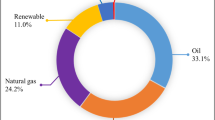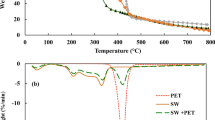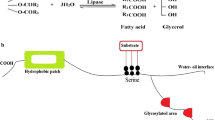Abstract
The problem with sourcing inedible feedstock is that a single plant species is not widely available, resulting in low oil yields which are unsustainable for commercial biodiesel production. Thus in this study, two high-FFA oils Madhuca indica (MI) and waste cooking oil (WCO) were tested for suitability as a blend for biodiesel production. Char obtained from carbonization and steam activation of Delonix regia pods and Mesua ferrea linn (MFL) seed shells were doped with KOH and H2SO4 for base and acid catalyst development to be used separately. In the two-step conversion process, the oil blend was esterified with methanol and acid catalyst, while esterified oil was transesterified with methanol:2-propanol blend and base catalyst. The parameters optimized for both processes (using L25 Taguchi matrices) were reaction temperature, reaction duration, catalyst concentration, alcohol concentration (methanol or methanol:2-propanol blend), and agitation speed. For esterification, MI:WCO ratio and for transesterification, methanol:2-propanol ratio were also optimized. With 98.27% FFA conversion, 99.05% biodiesel yield was the highest, and both carbonaceous supports showed comparable efficiency as catalyst supports. Obtained kinetic data conforms to pseudo-first order kinetic model, with Ea of 2.172 kJ/mol and 1.219 kJ/mol, with A of 45.61 min−1 and 20.97 min−1 for esterification and transesterification, respectively. With both catalysts showing good reusability, the catalyst preparation costs were only $0.047/L of esterified oil and $0.016/L of biodiesel. Therefore, the established cost-efficient process can be used for producing biodiesel with high yields from compatible oil blends and thus reduce dependency on exclusive feedstock.










Similar content being viewed by others
Data Availability
All data generated or analyzed during this study are included in this published article.
References
Swain KC (2014) Biofuel production in India: potential, prospectus and technology. J Fundam Renew Energy Appl 4:129
Food Outlook - Oilseeds, Food and Agricultural Organization (FAO). July 2018. https://www.google.com/url?sa=t&source=web&rct=j&url=http://www.fao.org/fileadmin/templates/est/COMM_MARKETS_MONITORING/Oilcrops/Documents/Food_outlook_oilseeds/FO_Oilcrops.pdf&ved=2ahUKEwjkisGPhJbuAhUA63MBHbi2AhkQFjAAegQIBBAC&usg=AOvVaw1DTAWOWQLKE0kMhqxqv4Lz
Alcantara R, Amores J, Canoira L, Fidalgo E, Franco MJ, Navarro A (2000) Catalytic production of biodiesel from soybean oil, used frying oil and tallow. Biomass Bioener 18:515–527
Berrios M, Siles J, Martin MA, Martin A (2007) A kinetic study of the esterification of free fatty acids (FFA) in sunflower oil. Fuel 86:2383–2388
Agra IB, Warnijati S, Wiratni, (1996) Two steps ethanolysis of castor oil using sulphuric acid as catalyst to produce motor oil. Renew Energy 9:1025–1028
Sukumar P, Vedaraman N (2005) Mahua oil (Madhuca indica seed oil) methyl ester as biodiesel preparation and emission characteristics. Biomass Bioener 28:87–93
Bokhari A, Chuah LF et al (2016) Optimisation on pretreament of rubber seed (Hevea brasiliensis) oil via esterification reaction in a hydrodynamic cavitation reactor. Biores Technol 199:414–422
Senthil Kumar M, Ramesh A, Nagalingam B (2003) An experimental comparison of methods to use methanol and Jatropha oil in a compression ignition engine. Biomass Bioener 25:309–318
Dugala NS, Goindi GS, Sharma A (2020) Evaluation of physicochemical characteristics of Mahua (Madhuca indica) and Jatropha (Jatropha curcas) dual biodiesel blends with diesel. J King Saud Univ Eng Sci. https://doi.org/10.1016/j.jksues.2020.05.006
Karmakar B, Halder G (2019) Progress and future of biodiesel synthesis: advancements in oil extraction and conversion technologies. Energy Conv Manage 182:307–339
Dhawane SH, Karmakar B, Ghosh S, Halder G (2018) Parametric optimisation of biodiesel synthesis from waste cooking oil via Taguchi approach. J Env Chem Eng 6:3971–3980
Wan Omar WNN, Nordin N, Mohamed M, Amin NAS (2009) A two-step biodiesel production from waste cooking oil: optimization of pre-treatment step. J Appl Sci 9(17):3098–3103
Medina-Valtierra J, Sánchez-Olmos LA, Carrasco-Marin F, Sánchez-Cárdenas M (2017) Optimization models type Box-Behnken in the obtaining of biodiesel from waste frying oil using a large-acidity carbonaceous catalyst. Int J Chem Reac Eng. https://doi.org/10.1515/ijcre-2017-0072
Karmakar B, Ghosh B, Samanta S, Halder G (2020) Sulfonated catalytic esterification of Madhuca indica oil using waste Delonix regia: L16 Taguchi optimization and kinetics. Sustain Energy Technol Assess 37
Dhawane SH, Kumar T, Halder G (2016) Biodiesel synthesis from Hevea brasiliensis oil employing carbon supported heterogeneous catalyst: Optimization by Taguchi method. Renew Energy 89:506–514
Dhawane SH, Bora AP, Kumar T, Halder G (2017) Parametric optimization of biodiesel synthesis from rubber seed oil using iron doped carbon catalyst by Taguchi approach. Renew Energy 105:616–624
Canakci M, Van Gerpen J (2001) Biodiesel production from oils and fats with high free fatty acids. Trans ASAE 44(6):1429–1436
Arora R, Kapoor V, Toor AP (2014) Esterification of free fatty acids in waste oil using a carbon-based solid acid catalyst. ICETET 196–199.
Ghadge SV, Raheman H (2006) Process optimization for biodiesel production from mahua (Madhuca indica) oil using response surface methodology. Biores Technol 97:379–384
Muthukumaran C, Praniesh R, Navamani P, Swathi R, Sharmila G, Kumar NM (2017) Process optimization and kinetic modeling of biodiesel production using non-edible Madhuca indica oil. Fuel 195:217–225
Olubunmi BE, Karmakar B, Aderemi OM, Akpan Uduak G, Auta M, Halder G (2020) Parametric optimization by Taguchi L9 approach towards biodiesel production from restaurant waste oil using Fe-supported anthill catalyst. J Env Chem Eng 8
Maneerung T, Kawi S, Dai Y, Wang CH (2016) Sustainable biodiesel production via transesterification of waste cooking oil by using CaO catalysts prepared from chicken manure. Energy Convers Manage 123:487–497
Show S, Karmakar B, Halder G (2020) Sorptive uptake of anti-inflammatory drug ibuprofen by waste biomass–derived biochar: experimental and statistical analysis. Biomass Convers Bioref. https://doi.org/10.1007/s13399-020-00922-8
Mukherjee A, Karmakar B, Halder G (2020) Response surface optimized free radical grafting of methyl methacrylate on de-lignified rice straw for evaluating its application potential as flame retardant roofing material. Chem Eng J Adv. https://doi.org/10.1016/j.ceja.2020.100007
Vicente G, Coteron A, Martinez M, Aracil J (1998) Application of the factorial design of experiments and response surface methodology to optimize biodiesel production. Ind Crop Prod 8:29–35
Kılıç M, Uzun BB, Pütün E, Pütün AE (2013) Optimization of biodiesel production from castor oil using factorial design. Fuel Proc Tech 111:105–110
Karmakar B, Samanta S, Halder G (2020) Delonix regia heterogeneous catalyzed two-step biodiesel production from Pongamia pinnata oil using methanol and 2-propanol. J Clean Prod 255
Methods for testing Commercial fatty acids, https://www.aocs.org/Documents/TechnicalPDF/Methods/6th/S1_64.pdf.
Karmakar B, Hossain A, Jha B, Sagar R, Halder G (2021) Factorial optimization of biodiesel synthesis from castor-karanja oil blend with methanol-isopropanol mixture through acid/base doped Delonix regia heterogeneous catalysis. Fuel 285
Karmakar B, Ghosh B, Halder G (2020) Sulfonated Mesua ferrea linn seed shell catalyzed biodiesel synthesis from castor oil – response surface optimization. Front Energy Res. https://doi.org/10.3389/fenrg.2020.576792
Torrentes-Espinoza G, Miranda BC, Vega-Baudrit J, Mata-Segreda Julio F (2017) Castor oil (Ricinus communis) supercritical methanolysis. Energy 140:426–435
Kumar RS, Kumar KS, Velraj R (2015) Optimization of biodiesel production from Manilkara zapota (L.) seed oil using Taguchi method. Fuel 140:90–96
Jain S, Sharma MP, Rajvanshi S (2011) Acid base catalyzed transesterification kinetics of waste cooking oil. Fuel Proc Tech 92:32–38
Canoira L, Garcıa Galeán J, Alcántara R, Lapuerta M, Garcıa-Contreras R (2010) Fatty acid methyl esters (FAMEs) from castor oil: production process assessment and synergistic effects in its properties. Renew Energy 35:208–217
Hidayat A, Rochmadi WK, Budiman A (2015) Esterification of free fatty acid on palm fatty acid distillate using activated carbon catalysts generated from coconut shell. Proc Chem 16:365–371
Kılıç M, Uzun BB, Pütün E, Pütün AE (2013) Optimization of biodiesel production from castor oil using factorial design. Fuel Process Technol 111:105–110
Neeharika TSVR, Bhimjiyani VH, Dole BR, Prasanna Rani KN, Karadbhajne VY, Prasad RBN (2017) Esterification of free fatty acids present in Jatropha oil: A kinetic study. Ind J Chem Tech 24:213–217
Karmakar B, Dhawane SH, Halder G (2018) Optimization of biodiesel production from castor oil by Taguchi design. J Env Chem Eng 6:2684–2695
Ramachandran K, Sivakumar P, Suganya T, Renganathan S (2011) Production of biodiesel from mixed waste vegetable oil using an aluminium hydrogen sulphate as a heterogeneous acid catalyst. Biores Technol 102:7289–7293
Goyal P, Sharma MP, Jain S (2012) Optimization of esterification and transesterification of high FFA Jatropha curcas oil using response surface methodology. J Petro Sci Res 1:36–43
Aldo O, Temu AK, Ntalikwa JW, Ogwok P (2010) Optimization of biodiesel production from Jatropha oil. Int J Eng Res Afr 3:62–73
Ahmad T, Danish M, Kale P, Geremew B, Adeloju SB, Nizami M, Ayoub M (2019) Optimization of process variables for biodiesel production by transesterification of flaxseed oil and produced biodiesel characterizations. Renew Energy 139:1272–1280
Ramezani K, Rowshanzamir S, Eikani MH (2010) Castor oil transesterification reaction: a kinetic study and optimization of parameters. Energy 35:4142–4148
Acknowledgements
The authors would like to express their sincere gratitude to the Department of Chemical Engineering, National Institute of Technology Durgapur for providing the resources and infrastructure vital in carrying out the reported work.
Funding
The authors are indebted to the Ministry of Science and Technology, Government of India, for their financial assistance through research project no. EEQ/2016/000243.
Author information
Authors and Affiliations
Contributions
Bisheswar Karmakar conceptualized the study and listed necessary resources while also handling software-based experimental designing and formal analysis as well as data curation. He also wrote the original draft. Jyoti Ranjan Mishra and Ayan Datta were the experimental investigators who also validated obtained data. Kantha Reddy Muthangi analyzed the technical data of study, while Onkar Nath Tiwari was involved in the sample analysis. Gopinath Halder was the supervisor and was in charge of this project. He also took the responsibility of reviewing and editing the manuscript and handling submission-related procedures. The final version of the manuscript was read and approved by all authors.
Corresponding author
Ethics declarations
Ethics approval and consent to participate
Not applicable.
Consent for publication
Not applicable.
Competing interests
The authors declare that they have no competing interests.
Additional information
Publisher's note
Springer Nature remains neutral with regard to jurisdictional claims in published maps and institutional affiliations.
Rights and permissions
About this article
Cite this article
Karmakar, B., Mishra, J.R., Datta, A. et al. Transesterifying Madhuca indica and waste cooking oil blends with C1–C3 alcohol mixtures: two-step catalysis using Delonix regia and Mesua ferrea linn supports. Biomass Conv. Bioref. 13, 7213–7237 (2023). https://doi.org/10.1007/s13399-021-01640-5
Received:
Revised:
Accepted:
Published:
Issue Date:
DOI: https://doi.org/10.1007/s13399-021-01640-5




